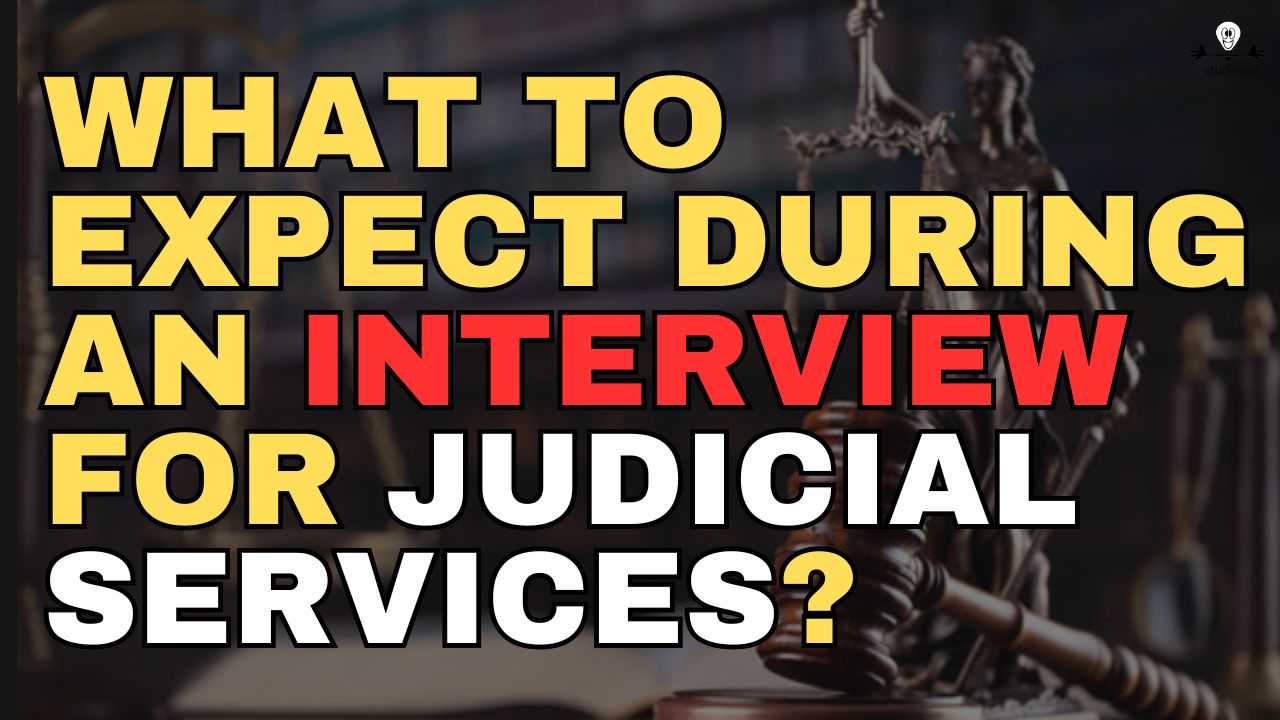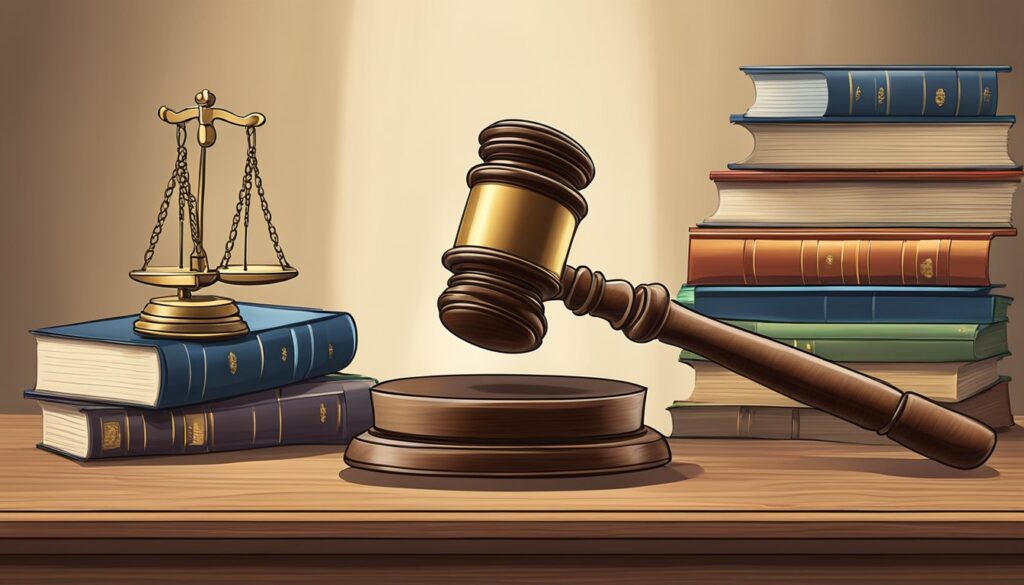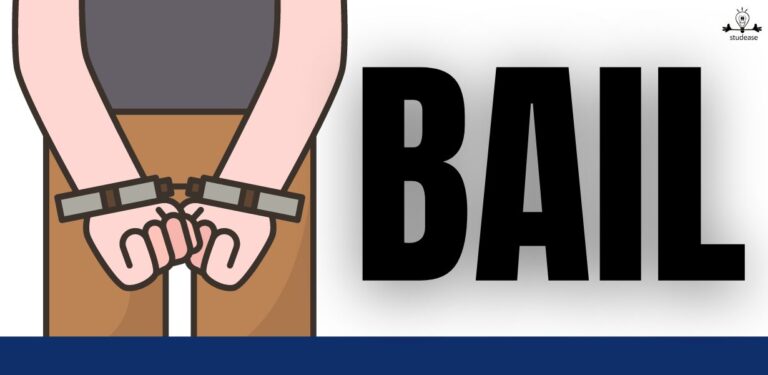What to Expect during an Interview for Judicial Services? Tips & Insights

If you are preparing for an interview for judicial services, it is important to know what the examiner expects from you. The interview process can be challenging, but with the right preparation, you can increase your chances of success in short period.
In this article, we will provide you with tips on how to prepare for a judicial services interview and what to expect during the process.

The judicial interview is a critical step in the application process for aspiring judges. The interview is designed to evaluate your knowledge, skills, and experience in the legal field.
During the interview, the examiner may ask you questions about your academic background, legal experience, and your understanding of the law. It is important to be prepared to answer these questions confidently and accurately.
As an applicant, you should be familiar with the legal updates and general awareness. This will help you gain confidence and tailor your answers as demanded.
Additionally, practice answering common interview questions and be prepared to discuss your strengths and weaknesses.
By following these tips, you can increase your chances of success during the judicial services interview process.
Page Contents
Understanding the Role of a Judicial Officer

As a potential candidate for Judicial Services, it is important to have a clear understanding of the role of a Judicial Officer. A Judicial Officer is responsible for upholding the law and ensuring that justice is served in a fair and impartial manner. In this section, we will discuss the duties and responsibilities of a Judicial Officer.
Duties and Responsibilities
As a Judicial Officer, your duties and responsibilities will vary depending on your position within the court system. However, some common duties and responsibilities include:
- Presiding over court proceedings: As a Judicial Officer, you will be responsible for presiding over court proceedings, which includes conducting trials, hearing arguments, and making rulings on legal issues.
- Writing opinions: After hearing a case, you will be responsible for writing an opinion that outlines your legal reasoning and decision.
- Research: As a Judicial Officer, you will be required to conduct legal research to ensure that your decisions are based on current legal principles and precedents.
- Working with law clerks: You may work with law clerks who will assist you with legal research, drafting opinions, and other tasks.
- Managing chambers: If you are a judge, you will be responsible for managing your chambers, which includes overseeing your staff, managing your docket, and ensuring that your court runs smoothly.
- Clerking: Before becoming a Judicial Officer, many candidates will complete a judicial clerkship. This involves working with a judge to gain experience in legal research, writing, and court proceedings.
Overall, as a Judicial Officer, you will play a critical role in upholding the law and ensuring that justice is served in a fair and impartial manner. It is important to take your duties and responsibilities seriously and to always act with integrity and professionalism.
Preparation for the Interview

Preparing for a Judicial Services interview can be a big task, but with the right preparation, you can increase your chances of success. Here are some tips to help you prepare for the interview:
Researching the Panel
It is important to research the panel that will be interviewing you. This will help you understand their background and the type of questions they may ask.
Reviewing Your Own Background
Reviewing your own background is crucial to preparing for the interview. You should be able to articulate your legal knowledge, education, and experience in a clear and concise manner.
Make sure to review your resume and any writing samples you may have submitted. Write relevant information only which is required.
Anticipating Common Interview Questions
Anticipating common interview questions is important to help you prepare for the interview. Some common questions include:
- Why do you want to be a judge?
- What qualities do you possess that make you a good candidate for the position?
- How do you handle difficult situations?
- What inspired you to pursue law?
- How would you handle a particular situation?
- How important is ethics in Judiciary?
- Biggest challenges in the legal system today?
Make sure to have well thought out answers to these questions.
Preparing Your Sample Questions & Answers
Preparing your sample questions and answers is important to help you prepare for the interview.
You can use your research on the panel and common interview questions to create a list of potential questions. Make sure to practice your answers and get feedback from others.
The Interview Process

When it comes to the Judicial Services interview process, it’s important to be prepared and know what to expect. Here are some key factors to keep in mind.
Initial Contact and Scheduling
Once you’ve been selected for an interview, you’ll typically receive an initial contact from the interviewer or their office to schedule a time and date.
What to Expect on the Day of the Interview
On the day of the interview, you’ll typically be expected to arrive early and dress professionally.
You may need to bring certain documents or materials with you, such as your resume or a writing sample.
During the interview itself, you can expect to engage in a conversation with the interviewer.
Be prepared to answer questions thoughtfully and thoroughly, and to engage in a professional and respectful interaction.
Type of Interviews
There are several types of interviews that you may encounter during the Judicial Services interview process. These may include:
- Panel interviews, where you’ll be interviewed by multiple individuals at once
- One-on-one interviews, where you’ll meet with a single interviewer
- Behavioral interviews, where you’ll be asked to describe specific situations or experiences in your past
Each type of interview has its own unique characteristics and challenges. Be prepared to adapt to different interview styles and formats, and to showcase your strengths and qualifications in a professional and confident manner.
Communicating Effectively
Verbal Communication Skills
During an interview for judicial services, your verbal communication skills play a vital role in creating a positive impression on the examiner.
It is essential to speak clearly and confidently, so the examiner can easily understand your responses.
Ensure that you listen carefully to the questions and take a moment to gather your thoughts before answering.
Avoid using filler words such as “um” and “ah” as they can make you sound unsure of yourself.
Non-Verbal Communication Idea
Non-verbal communication is just as important as verbal communication during an interview. Your body language can convey confidence, interest, and enthusiasm.
Maintain good posture, make eye contact, and smile when appropriate. Avoid fidgeting or slouching, as it can make you appear nervous or disinterested.
Follow-Up Etiquette
After the interview, it is crucial to follow up with a thank-you note or email. This gesture shows that you are interested in the position and appreciate the examiner’s time.
Keep the note concise and professional, thanking the examiner for the opportunity.
Building a Strong Professional Network
One key to success in the legal profession is building a strong professional network. This can include colleagues, mentors, and other legal professionals who can offer guidance and support throughout your career.
Networking can also help you stay informed about job opportunities and changes in the legal field.
To build your network, consider attending legal conferences and events, joining professional organizations, and connecting with colleagues on social media platforms such as LinkedIn.
You can also reach out to alumni from your law school or seek out mentors in your field.
Continuing Legal Education and Staying Informed
As a legal professional, it’s important to stay informed about changes in the legal trends.
Continuing legal education courses can help you stay up-to-date on the latest developments in your field. They also demonstrate your commitment to ongoing learning.
You can also stay informed by reading legal news and publications, such as law journals and legal blogs.
Consider subscribing to newsletters and following legal experts on social media to stay informed about key issues and trends in your field. In addition, reading books and articles related to your area of practice can help you deepen your knowledge. It can also help you develop your analytical and writing skills.
By following these additional tips, you can demonstrate your commitment to your legal career and stand out as a strong candidate during your Judicial Services interview.
Why to Read Legal Updates daily?
Reading legal updates daily is crucial for several reasons, especially for those in the legal field, including law students, practicing lawyers, judges, and anyone preparing for judiciary exams. Here’s why it’s essential:
Staying Informed on New Laws and Amendments:
Legal systems are dynamic, with new laws, amendments, and legal interpretations emerging regularly. Reading daily updates ensures you’re aware of these changes, helping you apply the most current laws in your preparation.
Improving Legal Knowledge and Skills:
Regular exposure to legal updates enhances your legal knowledge base and analytical skills. While preparing for the interview phase, for aspirants, this habit contributes to a deeper understanding of subjects and better performance in the process.
It will support professional development, ensures the highest standards of practice, and contributes to the continuous learning necessary in a constantly evolving legal landscape.







